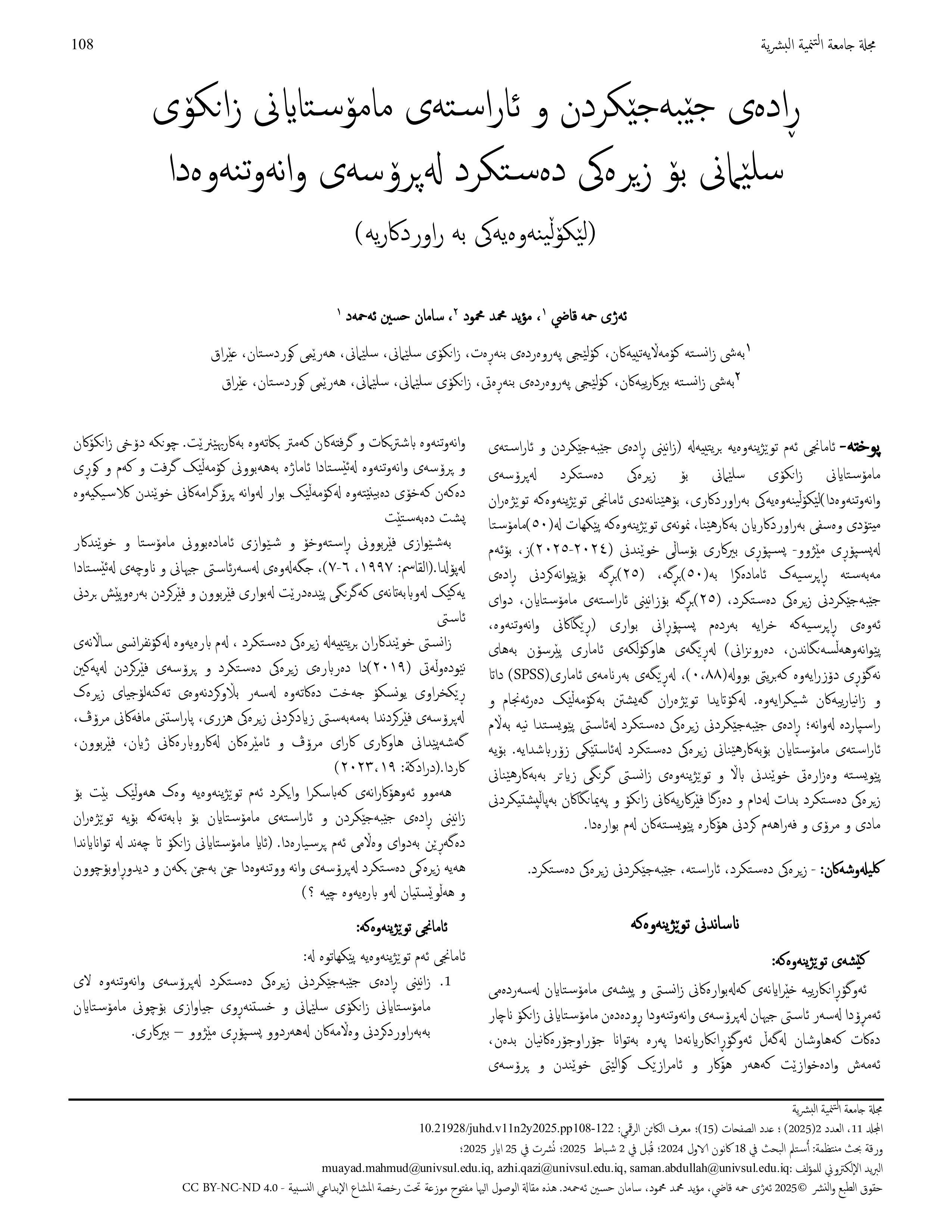University teachers’ Extent of the application of Artificial Intelligence and their Attitudes in the Teaching Process
A Comparative Study
DOI:
https://doi.org/10.21928/juhd.v11n2y2025.pp108-122Keywords:
Artificial Intelligence, Attitudes, Artificial Intelligence applicationAbstract
The aim of this research is to find out the extent of the application and the attitudes of teachers at the University of Sulaymaniyah toward artificial intelligence in the teaching process through a comparative study. To achieve the research objectives, the researchers used a descriptive comparative approach, with a sample of 50 teachers- 25 specializing in history and 25 specializing in mathematics- during the academic year 2024-2025. The researchers prepared a 50- item questionnaire: 25 items to assess the level of artificial intelligence applications and 25 items to evaluate the teachers’ attitudes toward it. and the questionnaire was reviewed by experts in teaching methods, evaluation and measurement and psychology. The Pearson correlation coefficient for the questionnaire’s reliability was found to be (0.88), which is considered acceptable. Data analysis was conducted using the SPSS program. The findings indicated that the application of artificial intelligence was below the expected level while their attitudes was very positive. Based on these results, the researchers recommend that the Ministry of Higher Education and Scientific Research provide financial and moral support to promote the use of artificial intelligence in universities and institutes.
References
أحمد و جاسم، علاالدین میسر و عزام علي(٢٠٢٢)، الذکاء الاصطناعي و دورە في تطویر التعلیم، مجلة الباحث کلیة التربیة الاساسیة، المجلد ١٩، العدد(٤)، ت(٢٣).
خماس، نغم فلاح ، (٢٠٢١)، اتجاهات مدرسي التاريخ في المرحلة الاعدادیة نحو التعلیم الالکترونیة، مجلة کلیة التربیة، الجامعة المستنصریة، العدد الرابع.
درادکة، أمجد محمود و آخرون(٢٠٢٣: ١٩)، فوائد استخدام تطبیقات الذکاء الاصطناعي في التعلیم الجامعي والتحدیات التي توجهة والحلول المقترحة من وجهة النضرطلبة دبلوم الادرة المدرسة العالی في جامعة عجلون الوطنیة، مجلة الدولیة للعلوم التربویة والاداب، الاردن، الاصدار(٢)، العدد(٥).
زیدان، رناعبدعلی(٢٠٢٣)، دورالذکاء الاصطناعي في تحسین جودة التعلیم العالي في العراق، مجلة کلیة التربیة الاساسیة، العدد الثاني والعشرون(٢٢)، لسنة العاشرة(٢٠٢٣)، الجزء الثالث.
شحاتة، حسن، النجار، زينب.(٢٠٠٣)، معجم المصطلحات التربوية والنفسية، ط١، الدار المصرية اللبنانية.
صالح، فاتن عبد الله إبراهيم. (٢٠٠٩)، أثر تطبيق الذكاء الاصطناعي والذكا العاطفي على جودة اتخاذ القرارات،(رسالة ماجستيرمنشورة)، كلية الاعمال، جامعة الشرق الاوسط للدراسات العليا.
عبدالطیف و الاخرون (٢٠٢٠)، فاعلیة نضام تدریس قائم علی الذکاء الاصطناعي لتنمیة الفهم العمیق للتفاعلات التعلم الذاتي لدی طلاب المرحلة الثانویة مجلة البحث العلمي في التربیة،(٢١).
عزمي، نبیل(٢٠١٤)، فاعلیة بیئة التعلم الکترونیة قئمة علی الذکاء الاصطناعي لحل مشکیلات صیانة شبکات الحاسب لدی طلاب تکنلوجیا التعلیم، مجلة دراسات و بحوث، (١-٢٢).
عیس ال مسلم، نهی ابراهیم (٢٠٢٣)، اتجهات معلمات العلوم نحو استخدام تطبیقات الذکاء الاصطناعي في العملیة التعلیمیة للمرحلة الابتدائیة باالادارة تعلیم منتقة جازان، رسالة ماجستر غیرمنشورة، جامعة جازان، کلیة التربیة.
الغامدي و القرني، سامیة فاضل و لینا أحمد(٢٠٢٠)، واقع استخدام تطبیقات الذکاء الاصطناعي في مدارس التربیة الخاصة بمدیة جدة من وجهة النضر المعلمات والاتجاه نحو، مجلة الدولیة للدراسات التربویة والنفسیة، المجلد (٨)، العدد(١-٢٠٢٠).
القاسم، صبحي(١٩٩٧)، التعلیم العالي في الوطن العربي، ط١، منتدی الفکر العربي، عمان- الاردن.
لیدافید لیتش و هدی نویر(٢٠٢١)، أسس الوکلاء الحاسبین، جامعة کالیفۆرنیا-امریکا.
لعلي ، عبد الستار ، واخرون ،(٢٠٠٩)، المدخل الى ادارة المعرفة ، دار المسيرة للنشر والطباعة ط٢، عمان-الاردن.
کبداني و بادن ، سید احمد و عبدالقادر (٢٠٢١)، أهمية استخدام تطبيقات الذكاء الاصطناعي بمؤسسات التعليم العالي الجزائرية، مجلـة دفاتر بوادكس، اجمللد 10 / العــدد: (01) (2021)، ص (١٥٣-١٧٦).
مکاوي، مرام عبدالرحمن(٢٠١٨)، الذکاء الاصطناعي علی أبواب التعلیم، مجلة القافلة، آرامکو-المملکة العربیة السعودیة، مجلد ٦٧، العدد (٠٦)، ص ص ٢٣-٢٤.
محمد، هاني أبو النضر عبدالستار(٢٠٢٣)، تقضیف تطبیقات الذکاء الاصطناعي في العملیة التعلیمیة من وجهة نضر المعلمین والطلاب، جامعة مطروح، کلیة التربیة.
Ocana-Fernandez, Y., Valenzuela-Fernandez, L., & Garro- Aburto, L. (2019). “Artificial Intelligence and its Implications in Higher Education”. Propósitos y Representations. 7(2), 536-568.
Southgate, E. (2019, Aug 13). Artificial Intelligence and Emerging Technologies in Schools: research report. APO.
rodriguez, L., de la caridad, G., & vina Brito, S. (2017). la inteligencia artificial en la edcation superior. Oportunidades y amenazas.
Mu, P. (2019, September). Research on artificial intelligence education and its value orientation. In 1st International Education Technology and Research Conference (IETRC 2019), China, Retrieved from https://webofproceedings. org/proceedings_series/ESSP/IETRC (Vol. 202019).
Chassignol, M., Khoroshavin, A., Klimova, A., & Bilyatdinova, A. (2018). Artificial Intelligence trends in education: a narrative overview. Procedia Computer Science, 136, 16-24.

Downloads
Published
How to Cite
Issue
Section
License
Copyright (c) 2025 Azhi Hama Qazi, Moaid Mohammed Mahmoud, Saman Hussein Ahmad

This work is licensed under a Creative Commons Attribution-NonCommercial-NoDerivatives 4.0 International License.


